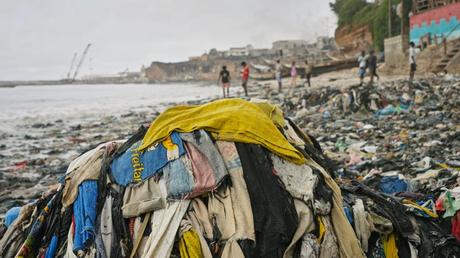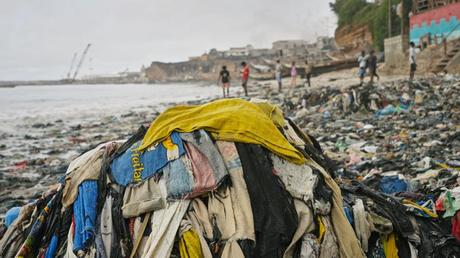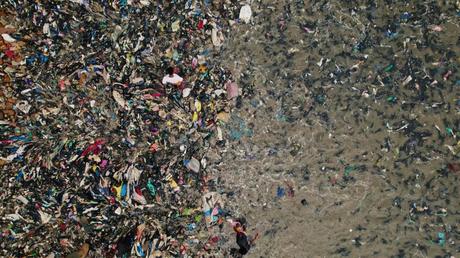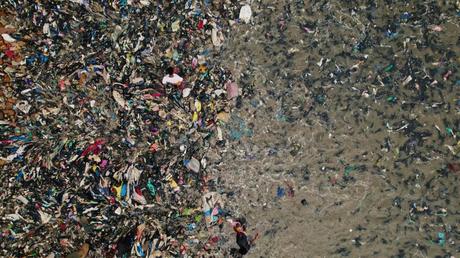PARIS - It may seem unusual that Australian director Eva Orner, who took home an Oscar for her expose on American interrogation practices during the war in Afghanistan, would turn her lens on the fashion industry.
In the new documentary 'Brandy Hellville & the Cult of Fast Fashion', Orner examines the toxic management culture of popular teen and tween brand Brandy Melville and delves deeper into the fast fashion supply chain and the waste it causes.
More from WWDA self-proclaimed fashion enthusiast, Orner had long been looking for a way to explore the clothing industry in documentary form.
Working with producers Jonathan and Simon Chinn of Searching for Sugarman fame, they uncovered Brandy Melville's story and workplace culture following an expose by Business Insider's Kate Taylor, who shed light on a series of discriminatory hiring practices and predatory management.
In the film, the company's toxic culture goes beyond the way it treated employees and extends to the larger problem of clothing disposal.
The Italian brand was first launched in the 1980s, but took off when it opened in Los Angeles in 2009. It was built on a series of platforms - first Tumblr, then Instagram and now TikTok - and captured the zeitgeist of the selfie-loving culture that emerged around social media.
Orner sees the role of social media as not only a major factor in the success of the Brandy Melville brand, but also in the disposal of clothing once it has already appeared as OOTD in someone's feed.
"This story is very much rooted in social media. But the joke is on the customer: they make videos promoting brands. And the companies are laughing all the way to the bank. Social media is really empowering and interesting to a certain extent, but I think it's also incredibly harmful," she told WWD.
The story continues
The documentary delves into claims about how top executives would solicit young employees for revealing photos sent to them daily, among other predatory behavior. Employees were instructed to fire employees who were overweight or had skin color; Black employees were allegedly relegated to the warehouse. Chief executive officer Stephan Marsan reportedly hung around stores to identify girls and teenagers he wanted hired and photographed.
She also points out that the majority of workers in the fashion industry are women, but they do not reap the financial, major business benefits.
"It is women who are the most important people working in the fashion industry," Orner said. "And its exploitation from the people who work in the cotton fields, through the women who are predominantly the workers, through the people who work on the shop floor, to the customers and the models, and everyone along the way. And it's just a series of women who are exploited, usually not all the time, but usually by white men who own the companies that are super rich," she said.


She also traced the brand's own supply chain, made in sweatshops in Italy and China, traveling to Ghana's Kantamanto market and nearby beaches where piles of clothing have washed up, creating mountains of waste.
During the making of the film, one of the most profound moments occurred when Orner and her team encountered the beaches miles away from the Kantamanto Market. It was night and under the moonlight they could still see the mountains of clothes.
"When we went there, me and my team, me and my team, we shot in war zones, and we told a lot of difficult stories and saw a lot of terrible parts of humanity. We're on that beach in Ghana, and it was horrible. There are actually no words. Thinking about it still gives me chills. It was so shocking to see our waste polluting their land.
"Everyone sees the images of the beaches and is just amazed. That's what I really wanted to capture because it's one of the lasting images of the film that's kind of burned into your brain," she said of the impact.
In the film, Orner speaks with former fashion designer Liz Ricketts, who now operates The Or Foundation in Ghana. The group advocates for globally responsible extended producer responsibility, as well as new frameworks for the fashion industry to take care of its waste.
Orner hopes the public understands that the good intentions of donating clothes still mean they are often dumped in these countries, and she reiterates that the waste stream follows old colonial lines. "Our penance means that we now send them all our waste so that they drown in our old clothes," she said.
The second-hand market started there as a way to repurpose clothing, but now much of the clothing is low-quality fast fashion that cannot be reused, and the majority is now made of fossil fuel-based synthetic fabrics, such as polyester, which are not biodegradable. breaks down into polluting microfibres.
The trailer went viral on TikTok ahead of the film's release on streamer Max, with approximately 2.8 million views. Orner hopes the film will reach the brand's target audience and inspire other former employees to share their stories.
Orner acknowledges that the first exposé did not get to the heart of the matter; Analysts estimate that Brandy Melville will surpass $332 million in sales by 2023, continuing its global expansion with outposts in countries like Australia and China. Plus ultra-fast fashion companies with even cheaper goods like Shein have stepped in. That company just crossed the $2 billion mark in profits as it pursues an initial public offering.
Orner hopes the film will lead to change. "I think we are at a tipping point. "A lot of young girls, like all the young women in the film - who are my absolute heroes because they speak out, are whistleblowers and are so brave - none of them are interested in buying fast fashion anymore," she said.
Orner noted that the film's final line, "We must buy less," is displayed large on the screen, saying that consumers hold the power.
"You will destroy these companies if purchasing drops by 20 or 30 percent. It will have a huge impact," she says. "People think they are powerless, but they are not."


